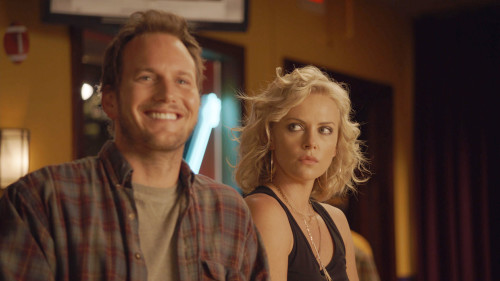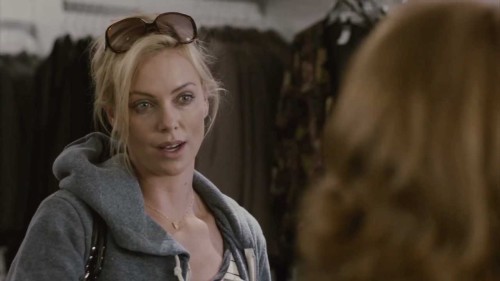This guest post by Diane Shipley appears as part of our theme week on Unlikable Women.
When the 2011 film Young Adult opens, things aren’t looking good for 37-year-old Mavis Gary (Charlize Theron). She’s divorced, her long-running gig ghost-writing the cheesy YA series Waverley Prep is coming to an end, and she spends her days asleep in front of the TV and her nights drinking herself into oblivion. So, naturally, when her high school boyfriend Buddy Slade (Patrick Wilson) includes her on a mass birth announcement email, she heads back to small town Mercury from Minneapolis in a misguided attempt to win him back.

Mavis is truly transgressive. Not only is her plan against most people’s moral code, it shows no solidarity for the sisterhood and no respect for the institutions women are most conditioned to aspire to: marriage and motherhood. Mavis alienates feminists and traditionalists alike. Not that she cares–she only wants to appeal to men. And she has done so, seemingly effortlessly, for a long time.
Now her marriage is over and her future employment looks uncertain, she isn’t facing up to her problems – she’s exacerbating them. She’s been using everything from alcohol to junk food to sex to try to feel better, but nothing’s worked. Her reasoning is that the time she felt best was in high school with Buddy, so trying to relive those days is the only logical solution.
When women in movies are unlikable, it’s usually in specific, gender-coded ways. The only acceptable imperfections for the female lead in a romantic comedy are clumsiness and occasionally, bossiness (as long as she gets her comeuppance). Women who are unabashedly lusty are either killed off (Fatal Attraction) or tolerated so long as they make fun of their looks and sexuality (Rebel Wilson in Pitch Perfect, Melissa McCarthy in Bridesmaids). When they’re trying to steal someone else’s husband, usually they’re superficial and two-dimensional, like Sarah Jessica Parker in The First Wives’ Club. A male character, meanwhile, can be shlubby, make fun of his friends, ignore his family, and still be the hero of the story.
Young Adult gives us a woman as immature as any Judd Apatow avatar, who is unapologetic about being outspoken, and refuses to be coy about either the fact that she’s beautiful or that she’s intent on getting Buddy back. She’s refreshingly and entirely unconcerned with being nice. She says things like, “Babies are boring,” and “I like your décor… is it shabby chic?” When her former classmate Matt Freehauf (Patton Oswalt) refers to the assault that left him with a bent penis, neurological damage, and difficulty walking, she enthuses, “Oh, you’re hate crime guy!” And after Buddy tells her they can’t be together because he’s married, her sincere response is, “I know, we can beat this thing together.”

Roxane Gay mentioned Young Adult in an insightful essay on unlikable characters, saying, “Some reviews go so far as to suggest that Mavis is mentally ill because there’s nothing more reliable than armchair diagnosis by disapproving critics… The simplest explanation, of Mavis as human, will not suffice.” She’s right to imply that we shouldn’t pathologize women for being complicated or unkind. Yet it’s not that much of a leap to conclude that Mavis is mentally ill.
She not only telegraphs this, she tells us. We see her pulling out her hair when she’s alone, lining it up in strands. Later, at her parents’ house, when she moves a hand to the back of her head, her dad says, “You’re not still pulling it out, are you?” signaling that this is a chronic issue. During an impromptu drinking session with Matt, she blurts out, “I have depression.” But the moment that’s key to understanding Mavis’s state of mind is when Buddy’s wife Beth (Elizabeth Reaser) explains that she teaches the “special needs” children she works with about emotions using a chart to illustrate the facial expressions that accompany each one. Mavis stares at it blankly before asking, “What about neutral? What if you don’t feel anything?”
Roger Ebert’s otherwise excellent review of the film said that if Mavis weren’t an alcoholic, she “would simply be insane.” The Guardian called her “ever so slightly bonkers.” And while YA author Maureen Johnson recognised that Mavis has serious mental health problems, she also went on to say that she’s “insane.” She isn’t, because that isn’t a thing: “insanity” is a legal defence, not a diagnosis. When someone wants to belittle a woman, they often call her “crazy,” say she’s “nuts” or “insane.” Whether the person in question is mentally ill or not, this helps stigmatise mental illness, drawing an artificial line between “them” and “us,” as if mental health isn’t a spectrum. As if millions of people don’t experience mental health problems all the time. For many of us, it’s something that makes a character more relatable, not less.
Yes, Mavis is either in deep denial or experiencing delusions about how her ex feels about her, and she needs to take responsibility for her appalling behavior. Plus, as she acknowledges twice, she’s showing all the signs of alcoholism. But she’s also survived on her own for years without a real support system, living in a major city and succeeding in a competitive field, as shallow as her writing might be. She’s even retained a girlfriend from high school. Considering how hard depression makes it to just get out of bed, she’s a fucking champion.

It’s plausible that depression is the reason for much of Mavis’ conduct, including her drinking. But it’s hard to tease out how much of her temperament is due to mental illness, and how much is her core personality. From what we hear about her time in high school (including that she called Matt “theatre fag”), she’s always been lacking in empathy, but maybe her mean girl act was a protective mechanism. We don’t know, and the fact that writer Diablo Cody and director Jason Reitman don’t spell this out is a gift. Mavis being cruel and self-centred makes Young Adult more complex than many portrayals of mental illness. Too often, it’s either the basis for a “psycho” horror movie or an “inspiring” story where someone turns out to be sweet, charming, and boring as soon as they’re medicated.
A lot of the reviews I’ve seen suggest that Mavis has no character arc, that she isn’t changed by the events of the movie. But she is. When she has sex with Matt, she’s in a stick-on bra and tights, her hair limp, dress stained, and make-up smeared. It’s a stark contrast to the start of the film, where she gets dolled up to go to bed with a man she’s never met before. The next morning, she offers the coffee pot to Matt’s sister Sandra before pouring herself a cup. She even admits to Sandra that she’s not as successful as she’s making out, that she doesn’t know how to be happy. It seems like she might be about to make some major changes, but then Sandra blows smoke up her ass, enables her, and says she doesn’t need to change a thing.
Mavis accepts this, agreeing that she’s probably OK after all. But she still goes back to her hotel room, shows her dog some affection for the first time in the film, and throws Buddy’s old sweatshirt into the trash. More significantly, as she finally finishes the last Waverley Prep in a diner on the way home, she has her lead character waving goodbye to high school and never looking back.
Things aren’t wrapped up neatly, it’s true; we don’t know if Mavis will actually seek psychological help, if she’ll go to AA, or if she’ll just slump back onto her sofa and carry on falling asleep to the dulcet tones of early-2000s reality shows for the next 20 years. Here’s a movie that acknowledges that change is hard and often infinitesimal; that credits us with the intelligence to draw our own conclusions about the lead character’s fate. Personally, I hope that 57-year-old Mavis is sober, I hope she has a luscious head of hair, and I hope she’s found a job that fulfills her. She might not ever be a “people person,” and she’ll certainly never be perfect. But she’ll at least always be interesting.
Diane Shipley is a journalist, feminist, and fan of photos of miniature dachshunds. Find her on Twitter @dianeshipley, on Tumblr, or in the UK, where she lives, for some reason.